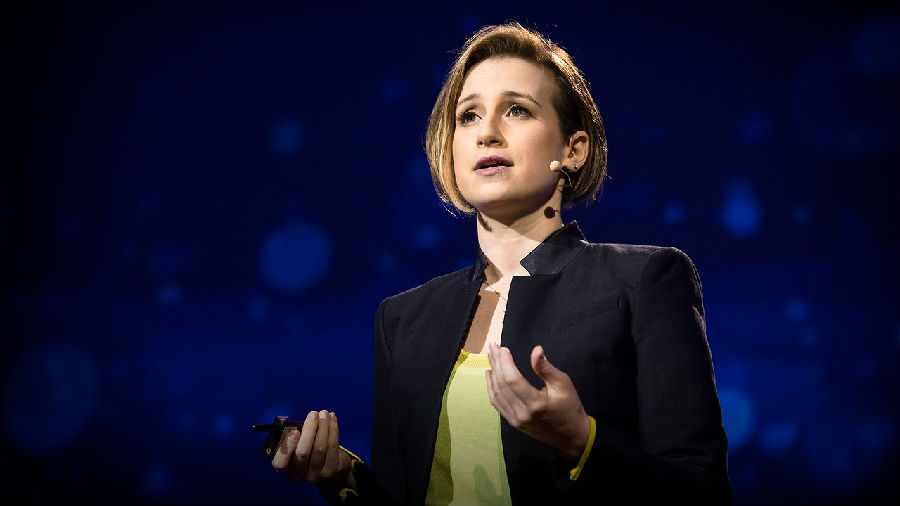(单词翻译:单击)
So the first antidepressants were made from, of all things, rocket fuel, left over after World War II.
抗忧郁药的诞生是由第二次世界大战所留下的火箭燃料所制成。
Which is fitting, seeing as today, one in five soldiers develop depression, or post-traumatic stress disorder or both.
相符的,就像今天有五分之一军人罹患了忧郁症,或创伤后压力症候群或两者皆得。
But it's not just soldiers that are at high risk for these diseases.
但不只有军人是高危险的族群。
It's firefighters, ER doctors, cancer patients, aid workers, refugees -- anyone exposed to trauma or major life stress.
消防员、急诊医生、癌症患者、援助工作者和难民等––任何暴露于精神创伤或重大生活压力下的人都可能罹患。
And yet, despite how commonplace these disorders are,
然而,尽管这些疾病很普遍,
our current treatments, if they work at all, only suppress symptoms.
我们目前所有的治疗方法,如果它们真的有效的话,只能抑制症状。
In 1798, when Edward Jenner discovered the first vaccine -- it happened to be for smallpox
1798年,爱德华·詹纳发现了首支疫苗––碰巧是用于天花上,
he didn't just discover a prophylactic for a disease,
他发现的不仅是一种疾病的预防用药,
but a whole new way of thinking: that medicine could prevent disease.
还是一种全新的思维方式:药物可以预防疾病。
However, for over 200 years, this prevention was not believed to extend to psychiatric diseases.
然而,200多年来,人们却不认为这种预防药物可扩展运用到精神疾病。
Until 2014, when my colleague and I accidentally discovered the first drugs that might prevent depression and PTSD.
直到2014年,当时我和同事偶然发现第一批可能预防忧郁症和创伤后压力症的药物。
We discovered the drugs in mice, and we're currently studying whether they work in humans.
药物是从老鼠试验中发现,目前正研究是否适用于人类。
And these preventative psychopharmaceuticals are not antidepressants. They are a whole new class of drug.
而这些预防性的精神药物不是抗忧郁药。它们是一类全新的药物。
And they work by increasing stress resilience, so let's call them resilience enhancers.
其效用是增强人们的耐压复原力,所以我们称之为复原力增强剂。
So think back to a stressful time that you've since recovered from.
回想一下你处于紧张状态恢复过来的时刻。
Maybe a breakup or an exam, you missed a flight.
也许由分手、考试或是你错过班机所引起。
Stress resilience is the active biological process that allows us to bounce back after stress.
耐压复原力是我们承受压力后,能够具韧性反弹的生物过程。
Similar to if you have a cold and your immune system fights it off.
类似于如果我们感冒了,免疫系统会对抗一样。
And insufficient resilience in the face of a significant enough stressor,
当面对严重的压力却无法具足够的韧性回弹时,
can result in a psychiatric disorder, such as depression.
能导致精神疾病,如忧郁症。
In fact, most cases of major depressive disorder are initially triggered by stress.
事实上多数主要的忧郁症,是由压力所引发的。
And from what we've seen so far in mice, resilience enhancers can protect against purely biological stressors,
目前从老鼠身上看到的情况是,复原力增强剂可防止单纯的生物性压力,
like stress hormones, and social and psychological stressors, like bullying and isolation.
像压力荷尔蒙以及社会和心理压力,如欺凌与孤立。

So here is an example where we gave mice three weeks of high levels of stress hormones.
以下的例子是我们给老鼠三周高剂量的压力荷尔蒙。
So, in other words, a biological stressor without a psychological component.
换句话说,没有掺杂心理因素的生物压力。
And this causes depressive behavior.
这同样导致忧郁行为。
And if we give three weeks of antidepressant treatment beforehand, it has no beneficial effects.
如果我们预先给予三周的抗忧郁治疗,并没有任何帮助。
But a single dose of a resilience enhancer given a week before completely prevents the depressive behavior.
但在一周前给予单剂量的复原力增强剂,就能完全预防忧郁的行为。
Even after three weeks of stress.
即使经过三周的压力后。
This is the first time a drug has ever been shown to prevent the negative effects of stress.
这是药物第一次出现能够预防压力形成负面影响的效果。
Depression and PTSD are chronic, often lifelong, clinical diseases.
忧郁症和创伤后压力症候群,通常是种慢性、终生的疾病。
They also increase the risk of substance abuse, homelessness, heart disease, Alzheimer's, suicide.
患者还会增强滥用药物、无家可归、心脏病、老年痴呆和自杀等风险。
The global cost of depression alone is over three trillion dollars per year.
光忧郁症的费用每年全球就超过3兆美元。
But now, imagine a scenario where we know someone is predictively at high risk for exposure to extreme stress.
但现在想象一下,我们预知某人将会处于极端压力的高风险下。
Say, a red cross volunteer going into an earthquake zone.
比如,一名红十字志愿者进入震灾区。
In addition to the typhoid vaccine, we could give her a pill or an injection of a resilience enhancer before she leaves.
在她前往灾区前,除了伤寒疫苗,我们可以给她一颗药丸或注射复原力增强疫苗。
So when she is held at gunpoint by looters or worse,
当她被抢劫者持枪恐吓或遇到更糟的情况时,
she would at least be protected against developing depression or PTSD after the fact.
至少可以防止在事后患上忧郁症或创伤后压力症候群。
It won't prevent her from experiencing the stress, but it will allow her to recover from it.
复原力增强剂不能阻止她经历这种压力,但会让她从中恢复过来。
And that's what's revolutionary here.
这就是革命性的所在。
By increasing resiliency, we can dramatically reduce her susceptibility to depression and PTSD,
通过提高对压力的弹性,我们可以大大降低她忧郁症和创伤后压力症的发病机率,
possibly saving her from losing her job, her home, her family or even her life.
可能挽回她失去工作、家庭、家人,甚至是她的生命。
After Jenner discovered the smallpox vaccine, a lot of other vaccines rapidly followed.
詹纳发现天花疫苗后,许多其他疫苗迅速接连地问世。
But it was over 150 years before a tuberculosis vaccine was widely available. Why?
但过了150多年,结核病疫苗才被广泛、普及地使用。为什么呢?
In part because society believed that tuberculosis made people more sensitive and creative and empathetic.
部分原因是社会相信结核病使人们更敏感、富创造性和同理心。
And that it was caused by constitution and not biology.
它是由体质,而非生物学所引发的。
And similar things are still said today about depression.
现今对忧郁症仍然有着类似的想法。
And just as Jenner's discovery opened the door for all of the vaccines that followed after,
正如詹纳的发现为之后的疫苗开启了大门;
the drugs we've discovered open the possibility of a whole new field: preventative psychopharmacology.
而我们发现的药物,可能开启了一个全新领域:预防性精神药理学。
But whether that's 15 years away, or 150 years away, depends not just on the science,
但结果是否要等15年或150年,不仅仅取决于科学,
but on what we as a society choose to do with it. Thank you.
而是我们这个社会选择要如何看待处理。谢谢。


